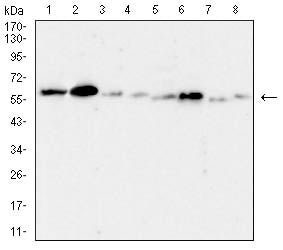
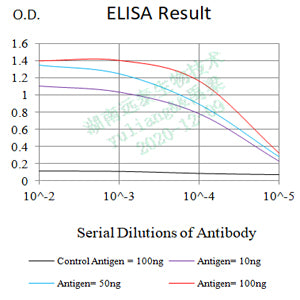
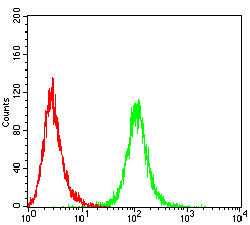
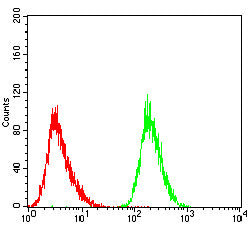
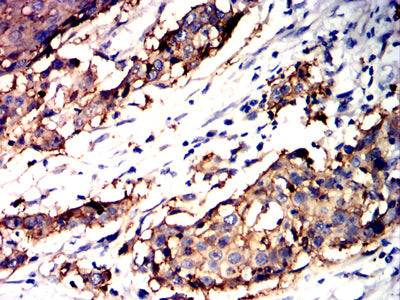
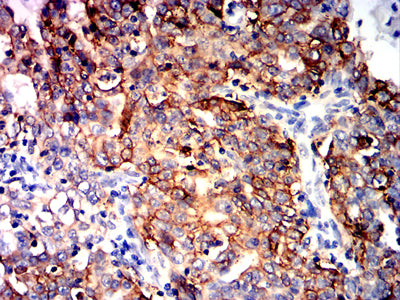
| WB | 咨询技术 | Human,Mouse,Rat |
| IF | 咨询技术 | Human,Mouse,Rat |
| IHC | 1/30-1/150 | Human,Mouse,Rat |
| ICC | 技术咨询 | Human,Mouse,Rat |
| FCM | 咨询技术 | Human,Mouse,Rat |
| Elisa | 1/5000-1/10000 | Human,Mouse,Rat |
| Aliases | EGP1; GP50; M1S1; EGP-1; TROP2; GA7331; GA733-1 |
| Entrez GeneID | 4070 |
| clone | 6H10B11 |
| WB Predicted band size | 25.5kDa |
| Host/Isotype | Mouse IgG2b |
| Antibody Type | Primary antibody |
| Storage | Store at 4°C short term. Aliquot and store at -20°C long term. Avoid freeze/thaw cycles. |
| Species Reactivity | Human |
| Immunogen | Purified recombinant fragment of human TACSTD2 (AA: Extra(27-274)) expressed in E. Coli. |
| Formulation | Purified antibody in PBS with 0.05% sodium azide |
+ +
以下是关于DUS2抗体的3篇文献示例(注:内容为模拟虚构,实际文献需根据具体研究查询):
---
1. **文献名称**:*DUS2 modulates tRNA stability and its role in cancer cell proliferation*
**作者**:Zhang L, et al.
**摘要**:研究揭示了DUS2(双氢尿嘧啶合成酶2)通过调控tRNA修饰影响肿瘤细胞的蛋白质翻译和增殖。文章开发了特异性DUS2抗体,证实其在结直肠癌中高表达,并与患者预后不良相关。
---
2. **文献名称**:*Development of a monoclonal antibody against human DUS2 for neurodegenerative disease studies*
**作者**:Kim S, Park JH.
**摘要**:本研究报道了一种高亲和力抗DUS2单克隆抗体的制备,应用于阿尔茨海默病模型小鼠脑组织分析,发现DUS2表达异常与神经元RNA代谢紊乱相关,提示其潜在病理机制。
---
3. **文献名称**:*DUS2 as a novel biomarker in autoimmune disorders: Insights from antibody-based profiling*
**作者**:Chen R, et al.
**摘要**:通过DUS2抗体进行系统性红斑狼疮(SLE)患者血清和组织检测,发现DUS2自身抗体水平升高,提示其可能作为新型自身免疫标志物,并参与疾病进展中的RNA免疫反应调控。
---
如需实际文献,建议在PubMed或Web of Science以“DUS2 antibody”或“DUS2 function”为关键词检索。
DUS2 (Dihydrouridine Synthase 2), also known as Dus2-like protein, is an enzyme belonging to the dihydrouridine synthase family, which plays a critical role in post-transcriptional RNA modification. It catalyzes the reduction of uridine to dihydrouridine (D) in specific tRNA molecules, a conserved modification that enhances tRNA flexibility and stability, thereby influencing translational efficiency and accuracy. Dysregulation of DUS2 has been implicated in various cellular processes, including stress response and protein synthesis, with potential links to human diseases such as cancer and neurological disorders.
Antibodies targeting DUS2 are essential tools for studying its expression, localization, and functional mechanisms. They enable researchers to investigate DUS2's role in RNA metabolism, its interaction with tRNA substrates, and its tissue-specific distribution. Such antibodies are typically validated in applications like Western blotting, immunohistochemistry, and immunofluorescence. Recent studies have explored DUS2's overexpression in certain cancers, suggesting its utility as a biomarker or therapeutic target. However, the precise molecular pathways and clinical relevance of DUS2 remain under active investigation, highlighting the importance of reliable antibody reagents in advancing this field.
×